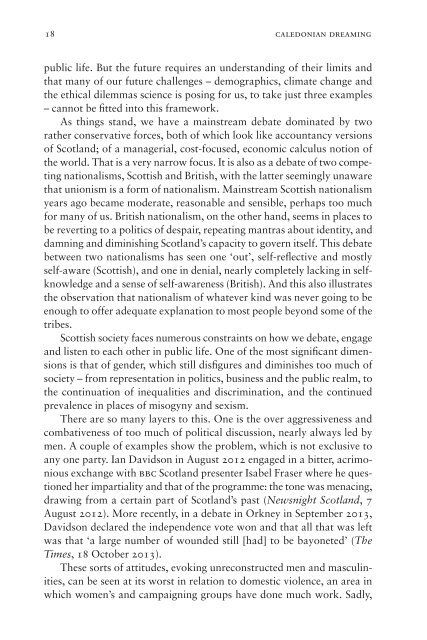Caledonian Dreaming by Gerry Hassan sampler
Caledonian Dreaming: The Quest for a Different Scotland offers a penetrating and original way forward for Scotland beyond the current independence debate. It identifies the myths of modern Scotland, describes what they say and why they need to be seen as myths. Hassan argues that Scotland is already changing, as traditional institutions and power decline and new forces emerge. He outlines a prospectus for Scotland to become more democratic and to embrace radical and far-reaching change.
Caledonian Dreaming: The Quest for a Different Scotland offers a penetrating and original way forward for Scotland beyond the current independence debate. It identifies the myths of modern Scotland, describes what they say and why they need to be seen as myths.
Hassan argues that Scotland is already changing, as traditional institutions and power decline and new forces emerge. He outlines a prospectus for Scotland to become more democratic and to embrace radical and far-reaching change.
Create successful ePaper yourself
Turn your PDF publications into a flip-book with our unique Google optimized e-Paper software.
18 caledonian dreaming<br />
public life. But the future requires an understanding of their limits and<br />
that many of our future challenges – demographics, climate change and<br />
the ethical dilemmas science is posing for us, to take just three examples<br />
– cannot be fitted into this framework.<br />
As things stand, we have a mainstream debate dominated <strong>by</strong> two<br />
rather conservative forces, both of which look like accountancy versions<br />
of Scotland; of a managerial, cost-focused, economic calculus notion of<br />
the world. That is a very narrow focus. It is also as a debate of two competing<br />
nationalisms, Scottish and British, with the latter seemingly unaware<br />
that unionism is a form of nationalism. Mainstream Scottish nationalism<br />
years ago became moderate, reasonable and sensible, perhaps too much<br />
for many of us. British nationalism, on the other hand, seems in places to<br />
be reverting to a politics of despair, repeating mantras about identity, and<br />
damning and diminishing Scotland’s capacity to govern itself. This debate<br />
between two nationalisms has seen one ‘out’, self-reflective and mostly<br />
self-aware (Scottish), and one in denial, nearly completely lacking in selfknowledge<br />
and a sense of self-awareness (British). And this also illustrates<br />
the observation that nationalism of whatever kind was never going to be<br />
enough to offer adequate explanation to most people beyond some of the<br />
tribes.<br />
Scottish society faces numerous constraints on how we debate, engage<br />
and listen to each other in public life. One of the most significant dimensions<br />
is that of gender, which still disfigures and diminishes too much of<br />
society – from representation in politics, business and the public realm, to<br />
the continuation of inequalities and discrimination, and the continued<br />
prevalence in places of misogyny and sexism.<br />
There are so many layers to this. One is the over aggressiveness and<br />
combativeness of too much of political discussion, nearly always led <strong>by</strong><br />
men. A couple of examples show the problem, which is not exclusive to<br />
any one party. Ian Davidson in August 2012 engaged in a bitter, acrimonious<br />
exchange with bbc Scotland presenter Isabel Fraser where he questioned<br />
her impartiality and that of the programme: the tone was menacing,<br />
drawing from a certain part of Scotland’s past (Newsnight Scotland, 7<br />
August 2012). More recently, in a debate in Orkney in September 2013,<br />
Davidson declared the independence vote won and that all that was left<br />
was that ‘a large number of wounded still [had] to be bayoneted’ (The<br />
Times, 18 October 2013).<br />
These sorts of attitudes, evoking unreconstructed men and masculinities,<br />
can be seen at its worst in relation to domestic violence, an area in<br />
which women’s and campaigning groups have done much work. Sadly,


















